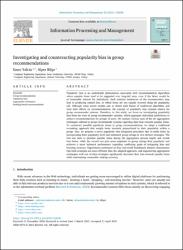| dc.contributor.author | Yalcin Emre | |
| dc.contributor.author | Bilge Alper | |
| dc.date.accessioned | 2022-05-05T11:49:11Z | |
| dc.date.available | 2022-05-05T11:49:11Z | |
| dc.date.issued | 2021 | tr |
| dc.identifier.uri | https://www.sciencedirect.com/science/article/abs/pii/S0306457321001047 | |
| dc.identifier.uri | https://hdl.handle.net/20.500.12418/12641 | |
| dc.description.abstract | Popularity bias is an undesirable phenomenon associated with recommendation algorithms where popular items tend to be suggested over long-tail ones, even if the latter would be of reasonable interest for individuals. Such intrinsic tendencies of the recommenders may lead to producing ranked lists, in which items are not equally covered along the popularity tail. Although some recent studies aim to detect such biases of traditional algorithms and treat their effects on recommendations, the concept of popularity bias remains elusive for group recommender systems. Therefore, in this study, we focus on investigating popularity bias from the view of group recommender systems, which aggregate individual preferences to achieve recommendations for groups of users. We analyze various state-of-the-art aggregation techniques utilized in group recommender systems regarding their bias towards popular items. To counteract possible popularity issues in group recommendations, we adapt a traditional re-ranking approach that weighs items inversely proportional to their popularity within a group. Also, we propose a novel popularity bias mitigation procedure that re-ranks items by incorporating their popularity level and estimated group ratings in two distinct strategies. The first one aims to penalize popular items during the aggregation process highly and avoids bias better, while the second one puts more emphasis on group ratings than popularity and achieves a more balanced performance regarding conflicting goals of mitigating bias and boosting accuracy. Experiments performed on four real-world benchmark datasets demonstrate that both strategies are more efficient than the adapted approach, and empowering aggregation techniques with one of these strategies significantly decreases their bias towards popular items while maintaining reasonable ranking accuracy. | tr |
| dc.language.iso | eng | tr |
| dc.publisher | Elsevier | tr |
| dc.relation.isversionof | 10.1016/j.ipm.2021.102608 | tr |
| dc.rights | info:eu-repo/semantics/restrictedAccess | tr |
| dc.subject | Group recommendation | tr |
| dc.subject | Popularity bias | tr |
| dc.subject | Aggregation techniques | tr |
| dc.subject | Ranking-based recommendation | tr |
| dc.title | Investigating and counteracting popularity bias in group recommendations | tr |
| dc.type | animation | tr |
| dc.relation.journal | Information Processing & Management | tr |
| dc.contributor.department | Mühendislik Fakültesi | tr |
| dc.contributor.authorID | 0000-0003-3818-6712 | tr |
| dc.identifier.volume | 58 | tr |
| dc.identifier.issue | 5 | tr |
| dc.identifier.startpage | 102608 | tr |
| dc.relation.publicationcategory | Uluslararası Hakemli Dergide Makale - Kurum Öğretim Elemanı | tr |















